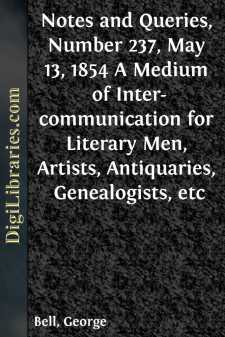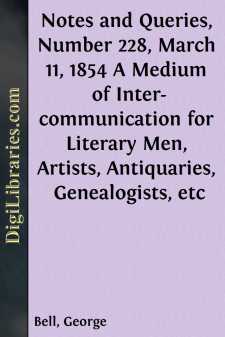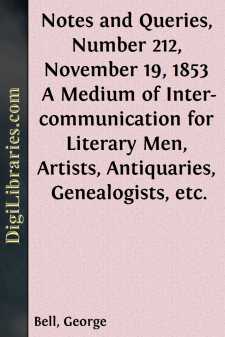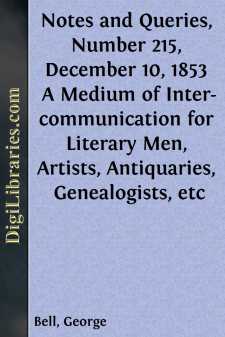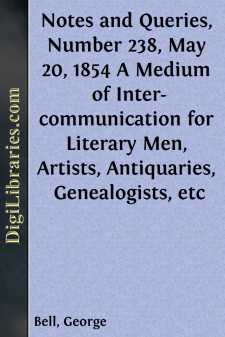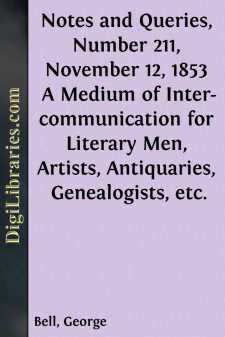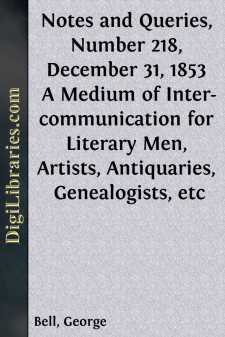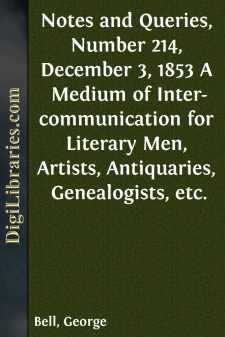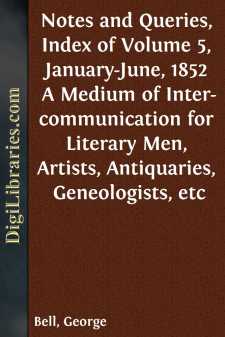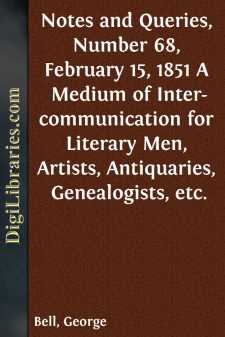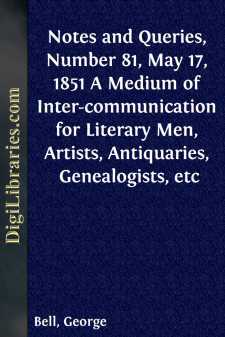Categories
- Antiques & Collectibles 13
- Architecture 36
- Art 48
- Bibles 22
- Biography & Autobiography 813
- Body, Mind & Spirit 142
- Business & Economics 28
- Children's Books 17
- Children's Fiction 14
- Computers 4
- Cooking 94
- Crafts & Hobbies 4
- Drama 346
- Education 46
- Family & Relationships 57
- Fiction 11829
- Games 19
- Gardening 17
- Health & Fitness 34
- History 1377
- House & Home 1
- Humor 147
- Juvenile Fiction 1873
- Juvenile Nonfiction 202
- Language Arts & Disciplines 88
- Law 16
- Literary Collections 686
- Literary Criticism 179
- Mathematics 13
- Medical 41
- Music 40
- Nature 179
- Non-Classifiable 1768
- Performing Arts 7
- Periodicals 1453
- Philosophy 64
- Photography 2
- Poetry 896
- Political Science 203
- Psychology 42
- Reference 154
- Religion 513
- Science 126
- Self-Help 84
- Social Science 81
- Sports & Recreation 34
- Study Aids 3
- Technology & Engineering 59
- Transportation 23
- Travel 463
- True Crime 29
Notes and Queries, Number 237, May 13, 1854 A Medium of Inter-communication for Literary Men, Artists, Antiquaries, Genealogists, etc
by: George Bell
Description:
Excerpt
"SHAKSPEARE'S RIME WHICH HE MADE AT THE MYTRE."
In the third volume of Mr. Collier's valuable History of Dramatic Poetry (p. 275.) is the following passage, which forms part of a note:
"Mr. Thorpe, the enterprising bookseller of Bedford Street, is in possession of a MS. full of songs and poems, in the handwriting of a person of the name of Richard Jackson, all copied prior to the year 1631, and including many unpublished pieces, by a variety of celebrated poets. One of the most curious is a song in five seven-line stanzas, thus headed 'Shakspeare's rime, which he made at the Mytre in Fleete Streete.' It begins 'From the rich Lavinian shore;' and some few of the lines were published by Playford, and set as a catch."
In Mr. Thoms' Anecdotes and Traditions (published by the Camden Society) is a story of the celebrated Dr. John Wilson, to which the editor has appended an interesting note, adding:
"Wilson was the composer of a glee for three voices, published in Playford's Musical Companion, where the words are attributed to Shakspeare; and the supposition that they were really written by him having been converted into a certainty, by their appearing with Shakspeare's name to them in the MS. Collection of Poetry, copied prior to 1631 by Richard Jackson," &c.
Mr. Thoms then prints the "rime," not inappropriately calling it "A Song for Autolycus," with this remark:
"My late respected friend Mr. Douce once told me, that some musical friend at Chichester, I think the organist, possessed a copy of this song, with an additional verse."
Mr. Thoms' version of "Shakspeare's Rime" was inserted (probably by our worthy Editor himself?) in the first volume of "N. & Q." (p. 23.) with a view of obtaining the additional stanza; a desideratum which I am now enabled to supply. The following copy has two additional stanzas, and is transcribed from a MS. Collection of Songs, with the music, written in the early part of the reign of James I. The MS. was formerly in the possession of Mr. J. S. Smith, the learned editor of Musica Antiqua.
I.
"From the fair Lavinian shore,
I your markets come to store;
Marvel not, I thus far dwell,
And hither bring my wares to sell;
Such is the sacred hunger of gold.
Then come to my pack,
While I cry,
What d'ye lack,
What d'ye buy?
For here it is to be sold.
II.
"I have beauty, honour, grace,
Virtue, favour, time and space,
And what else thou wouldst request,
E'en the thing thou likest best;
First, let me have but a touch of thy gold,
Then come too lad,
Thou shalt have
What thy dad
Never gave;
For here it is to be sold.
III.
"Though thy gentry be but young,
As the flow'r that this day sprung,
And thy father thee before,
Never arms nor scutcheon bore;
First let me have but a catch of thy gold,
Then, though thou be an ass,
By this light
Thou shalt pass
For a knight;
For here it is to be sold.
IV.
"Thou whose obscure birth so base,
Ranks among the ignoble race,
And desireth that thy name,
Unto honour should obtain;
First let me have but a catch of thy gold,
Then, though thou be an ass,
By this light,
Thou shalt pass
For a knight;
For here it is to be sold....


